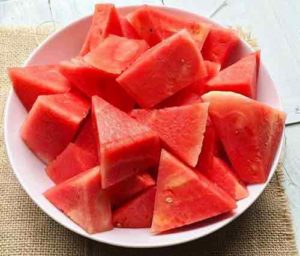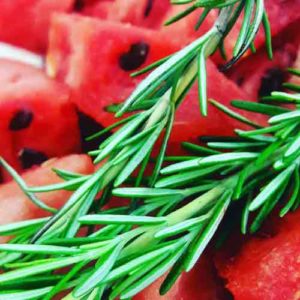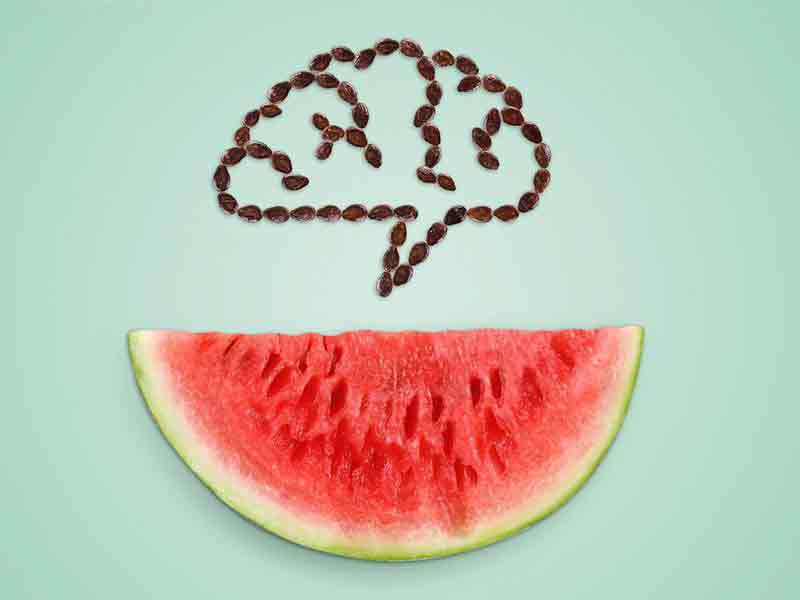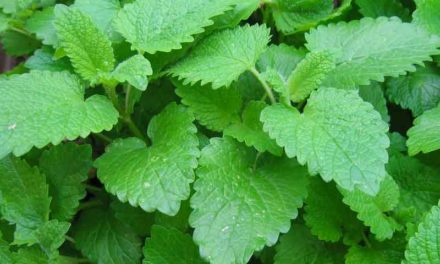It’s not summer yet until you have had some watermelon. What would a summer picnic be without a big, sloppy slice of watermelon to dig your face in, ear-deep? It’s not only sweet but also refreshing when the temperatures hit extreme highs.
Us Americans are big watermelon fans and eat over 17 lbs of watermelon each year. No wonder there is a whole month dedicated to it, July, National Watermelon Month. The United States currently ranks 6th in worldwide production of watermelon. The biggest US producers are Florida, Texas, California, Georgia and Arizona. According to Guinness World Records, the world’s heaviest watermelon weighed 350.5 lbs and was grown by Chris Kent of Sevierville, Tennessee in 2013.
 Watermelon’s official name is Citrullus Lanatus, and they are part of the same botanical family as cantaloupe and honeydew, the Cucurbitaceae family, and are native to Africa. The first recorded watermelon harvest took place nearly 5,000 years ago in Egypt and is depicted in hieroglyphics on ancient walls. Watermelons were often buried together with the kings and left in their tomb to nourish them in their life after death. It spread via merchant ships, and by the 10th century, it reached China, who is the world’s top producer of watermelon.
Watermelon’s official name is Citrullus Lanatus, and they are part of the same botanical family as cantaloupe and honeydew, the Cucurbitaceae family, and are native to Africa. The first recorded watermelon harvest took place nearly 5,000 years ago in Egypt and is depicted in hieroglyphics on ancient walls. Watermelons were often buried together with the kings and left in their tomb to nourish them in their life after death. It spread via merchant ships, and by the 10th century, it reached China, who is the world’s top producer of watermelon.
There are over 1,200 varieties grown in 96 countries worldwide, out of which the five top types of watermelon include seeded, seedless, mini, yellow and orange. Contrary to what most people think, seedless watermelon isn’t the product of genetic modification but rather of pure cross breeding. Watermelon is 100 percent edible, including the seeds and the rind.
Watermelon is not just delicious but has amazing benefits on your overall health. The good news is watermelon can be found in stores year round, and it is a great value: it’s the cheapest fruit you can buy, with only 14¢ per serving, according to a 2010 study by the Perishables Group. The widespread use of watermelon in traditional medicine was acknowledged in a study from Delta State University in Nigeria published in 2013 in The International Journal of Research in Pharmaceutical and Biomedical Sciences. The authors showed that watermelon was very prevalent in indigenous cultures thanks to its beneficial ingredients. The red fruit was used in folk medicine to treat kidney stones, high blood pressure, alcohol poisoning, diabetes, and other conditions.
What’s in it other than water?
 For a long time, watermelon has been considered only a sweet, tasty summertime fruit, made of sugar and water, and nothing more. You don’t have to feel guilty when having this desert as it has few calories (only 40 calories per cup), it is fat-free, and although it is around 92 percent water, it is rich in vitamins, minerals, and antioxidants with significant benefits to your overall health. One cup of watermelon ensures 17 percent of vitamin A, 21 percent of vitamin C, 2 percent of iron and 1 percent of calcium of the recommended daily intake. Watermelon also contains potassium, magnesium, vitamin B-6, thiamin, niacin, riboflavin, folate, pantothenic acid, phosphorus, zinc, selenium, copper, manganese, choline, betaine, and lycopene. The seeds are rich in iron and zinc. The rind, the part between the skin and the red flesh, contains the highest level of minerals and chlorophyll, and should not be just tossed away. Its juice is easily digestible, providing much-needed nutrients to the body.
For a long time, watermelon has been considered only a sweet, tasty summertime fruit, made of sugar and water, and nothing more. You don’t have to feel guilty when having this desert as it has few calories (only 40 calories per cup), it is fat-free, and although it is around 92 percent water, it is rich in vitamins, minerals, and antioxidants with significant benefits to your overall health. One cup of watermelon ensures 17 percent of vitamin A, 21 percent of vitamin C, 2 percent of iron and 1 percent of calcium of the recommended daily intake. Watermelon also contains potassium, magnesium, vitamin B-6, thiamin, niacin, riboflavin, folate, pantothenic acid, phosphorus, zinc, selenium, copper, manganese, choline, betaine, and lycopene. The seeds are rich in iron and zinc. The rind, the part between the skin and the red flesh, contains the highest level of minerals and chlorophyll, and should not be just tossed away. Its juice is easily digestible, providing much-needed nutrients to the body.
Watermelon has countless health benefits. Juicing watermelon allows increased consumption of nutrients, vitamins, and minerals than when eaten in solid form.
Heart health and blood flow
High blood pressure increases the risk of heart disease, stroke, heart attack, and kidney disease. Watermelon has high levels of lycopene and citrulline which makes it extremely beneficial for the heart. Citrulline is converted in your body into arginine, an essential amino acid which improves blood flow and relaxes blood vessels by helping your body synthesize and produce nitric oxide. The health benefits range from better stress management, more energy, reduction of muscle pain after exercise and improved performance in the bedroom. Watermelon juice also helps prevent cholesterol from clogging arteries. It can also increase HDL, the good cholesterol, thus reducing the risks of cardiovascular diseases.
A study at the Purdue University of Kentucky shows that the lycopene in watermelon lowers the risk of heart disease. Lycopene is responsible for the red color of watermelon. Arginine can help streamline blood flow and reduce the accumulation of fat. The researchers used two sample groups of mice and fed one with water containing 2 percent watermelon juice and the other one with water ‘supplemented with a solution that matched the carbohydrate content of the watermelon juice’. All the mice were fed foods high in cholesterol and saturated fat. The results showed that there was a reduction of about 50 percent of LDL cholesterol, or bad cholesterol, in the mice that drank the watermelon juice, and of around 50 percent of plaque buildup in their arteries. They also gained only 30 percent of the weight compared to the other group of mice. Researchers noticed the mice who drank watermelon had higher levels of citrulline and concluded that the citrulline in watermelon can lower the levels of cholesterol in the blood, including bad cholesterol and prevent any extra weight gain.
According to a study published in the American Journal of Hypertension, watermelon helped reduce high blood pressure in obese adults. Potassium also helps cap blood pressure.
According to a study published in 2013 by Florida State University, women after menopause had better cardiovascular health after they took watermelon extract supplements containing citrulline and arginine for six weeks. Another study published by the same psychologist in 2012 showed that these supplements helped treat hypertension in obese, middle-aged adults.
Hydration
Watermelon is full of electrolytes and helps you stay hydrated, which is critical on a hot summer day. No wonder since it’s made of more than 90 percent water. The best electrolyte in watermelon is potassium with 5 percent potassium per serving. Not only it increases hydration levels in the body, but potassium also keeps the oxygen supply to your cells going and regulates heartbeat and muscle function.
On a hot summer day, higher temperatures make you lose more water through perspiration, so it is important to replace your fluid content to maintain overall health. Dehydration causes severe headaches, poor concentration, and fatigue. A prolonged imbalance of potassium and sodium, for example, when you eat salty foods and not enough fruits and vegetables, can increase your risk of developing high blood pressure, heart disease, and even stroke.
So swap that energy drink that contains way too much caffeine and sugar for a slice of watermelon or a watermelon smoothie.
Anti-inflammatory properties
Watermelon helps inhibit inflammation thanks to its ingredients lycopene, choline, vitamin C and beta-carotene. These nutrients increase if a watermelon is riper. So when you buy melons, make sure you let them ripen for a while before you eat or juice them. Watermelon reduces inflammation that contributes to conditions like osteoarthritis or rheumatoid arthritis. Watermelon also contains cucurbitacin E, a compound that reduces pain and the activity of certain enzymes that cause inflammation.
Digestion and Detox
 Watermelons have a high fiber content and regulate bowel movement, thus preventing constipation. Watermelon juice cleanses your kidneys and bladder of toxins. The potassium in watermelon helps eliminate toxins and clear waste from our blood. If these toxins aren’t eliminated, they build up in our kidneys, and this may lead to higher concentrations of uric acid in our veins, which may create kidney stones. Watermelon is a natural diuretic and a safe and efficient solution to cleanse your kidneys, unlike other diuretics like coffee or pills for weight loss. So although you might need to use the restroom more when eating watermelon, it’s for your own good!
Watermelons have a high fiber content and regulate bowel movement, thus preventing constipation. Watermelon juice cleanses your kidneys and bladder of toxins. The potassium in watermelon helps eliminate toxins and clear waste from our blood. If these toxins aren’t eliminated, they build up in our kidneys, and this may lead to higher concentrations of uric acid in our veins, which may create kidney stones. Watermelon is a natural diuretic and a safe and efficient solution to cleanse your kidneys, unlike other diuretics like coffee or pills for weight loss. So although you might need to use the restroom more when eating watermelon, it’s for your own good!
Beauty
Staying hydrated is essential for healthy looking skin and hair, but did you know that vitamins A and C also play a part? Vitamins A and C are good for your skin and hair and keep them moisturized. They promote the growth of new collagen and elastin cells, according to the Cleveland Clinic, which is critical since 80 percent of our skin is collagen. Foods rich in vitamin C protect your skin from the damaging effects of sun rays, lighten dark skin spots and help wounds heal faster. A cup of watermelon contains nearly one-quarter of your recommended daily dose.
Cancer
Watermelon helps reduce the risk of cancer thanks to its antioxidant properties. It contains more lycopene, a powerful antioxidant, than any other fruit or vegetable. Other fruits that contain lycopene include tomatoes, pink grapefruit, guava, and apricots. The National Cancer Institute has linked lycopene to reducing prostate cancer cell multiplication. Research has shown including more lycopene-rich foods in our diet leads to a lower incidence of many other cancers like stomach, lung, colon and pancreatic.
Lycopene also prevents the formation of free radicals that cause cancer. It also protects your skin from UV damage that can lead to premature aging and skin cancer. Next time you hit the beach, consider drinking a big glass of watermelon juice before.
Muscle pain
 A study published in 2013 in the Journal of Agricultural and Food Chemistry showed that drinking watermelon before a serious workout could reduce next-day muscle soreness and reduce heart rate. This is due to watermelon’s amino acids citrulline which the body converts to arginine, which improves circulation and transports oxygen to muscles. The study had seven male participants who were administered 17 ounces (500 ml) of either natural watermelon juice, citrulline-enriched watermelon juice, or a placebo drink an hour before exercising. Interestingly, the study showed that the natural juice was just as effective as the enriched juice. The researchers also determined that citrulline is absorbed better by intestinal cells from watermelon juice than from citrulline supplements, especially if the juice is not pasteurized.
A study published in 2013 in the Journal of Agricultural and Food Chemistry showed that drinking watermelon before a serious workout could reduce next-day muscle soreness and reduce heart rate. This is due to watermelon’s amino acids citrulline which the body converts to arginine, which improves circulation and transports oxygen to muscles. The study had seven male participants who were administered 17 ounces (500 ml) of either natural watermelon juice, citrulline-enriched watermelon juice, or a placebo drink an hour before exercising. Interestingly, the study showed that the natural juice was just as effective as the enriched juice. The researchers also determined that citrulline is absorbed better by intestinal cells from watermelon juice than from citrulline supplements, especially if the juice is not pasteurized.
The rind should not be thrown away, as they are nutritionally loaded with citrulline. Citrulline is not only good for exercise, but also for Alzheimer’s disease and even erectile dysfunction. So before you head to the gym or go for a jog, make sure to drink some watermelon juice.
Obesity and weight control
Animal studies have shown that citrulline interferes with the storage of fat in fat cells by blocking the effects of an enzyme called TNAP involved in the accumulation of fat. There are quite a few watermelon diets. Obesity is dangerous for overall health and is an indirect cause of death. It causes some health problems, such as heart disease, dysfunctional blood circulation, respiratory disorders and organ failures.
Watermelon also has a diuretic function, reduces water retention and helps eliminate excess fluids, especially in pregnant women or for women during their menstruation cycle.
Immune system
Vitamin B6 is found in watermelon and helps the immune system produce antibodies much needed to fight diseases. Vitamin C can also help your immune system fight against infections and viruses.
Liver
The therapeutic effect on the liver of drinking watermelon juice was confirmed by a study published in 2011 in Food and Chemical Toxicology. Participants in the study who drank watermelon juice had reduced liver damage from exposure to carbon tetrachloride. Carbon tetrachloride is a toxic chemical found in the air and industrial products that have adverse effects on the brain, the kidneys, and liver.
Diabetes
The hormone insulin is vital for our bodies as it helps regulate sugar levels in our blood. In the case of type 2 diabetes, our bodies become insulin resistant, which means blood sugar levels aren’t stabilized, and this can lead to high blood glucose levels and obesity. Some studies found that the arginine in watermelon decreases insulin resistance.
People with diabetes should consume watermelon with moderation as it has simple sugars such as sucrose, fructose, and glucose, and has a very high glycemic Index coming (around 72), so make sure to count the carbs in your watermelon serving.
Asthma
People who consume nutrients such as vitamin C are less likely to develop asthma. The powerful anti-oxidant in watermelon reduces toxins in the body that in turn reduces the risk of asthma attacks.
Health risks
Watermelon doesn’t have any side effects if consumed in reasonable amounts. However, some health problems can appear when the intake of lycopene or potassium found in watermelons is too high. Eating too much watermelon can lead to nausea, diarrhea, bloating or irregular heartbeats. People with diabetes should also enjoy it in moderation due to its sugar content.
How to pick your watermelon
Examine the watermelon. You are looking for a hard and symmetrical watermelon. Make sure it does not have any bruises, cuts or dents. The watermelon should be heavy for its size. Look for the creamy yellow spot from where it sat on the ground and ripened in the sun on the underside of the watermelon.
How to incorporate watermelon into your diet
If you find just grabbing a slice boring, there are some fun ways to include it in your diet. You can juice it, make slushies, ice cream, delicious cocktails with basil, ginger or mint, salads with feta, shrimp and what not, wherever your imagination takes you. Did you know you can even grill it?
For more fun ideas, such as watermelon carvings, or recipes, information about festivals, retailers and wholesalers, contests, nutrition facts, how to cut your watermelon and what not, don’t forget to check out the National Watermelon Promotion Board, which represents 1,500 watermelon growers, shippers and importers nationwide and aims to raise awareness of the many benefits of watermelon.
Resources:






